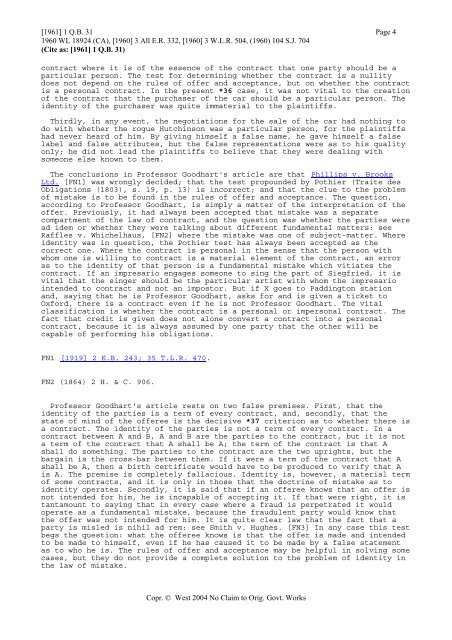Tesco v Constain - Thomson Reuters
Tesco v Constain - Thomson Reuters
Tesco v Constain - Thomson Reuters
You also want an ePaper? Increase the reach of your titles
YUMPU automatically turns print PDFs into web optimized ePapers that Google loves.
[1961] 1 Q.B. 31 Page 41960 WL 18924 (CA), [1960] 3 All E.R. 332, [1960] 3 W.L.R. 504, (1960) 104 S.J. 704(Cite as: [1961] 1 Q.B. 31)contract where it is of the essence of the contract that one party should be aparticular person. The test for determining whether the contract is a nullitydoes not depend on the rules of offer and acceptance, but on whether the contractis a personal contract. In the present *36 case, it was not vital to the creationof the contract that the purchaser of the car should be a particular person. Theidentity of the purchaser was quite immaterial to the plaintiffs.Thirdly, in any event, the negotiations for the sale of the car had nothing todo with whether the rogue Hutchinson was a particular person, for the plaintiffshad never heard of him. By giving himself a false name, he gave himself a falselabel and false attributes, but the false representations were as to his qualityonly; he did not lead the plaintiffs to believe that they were dealing withsomeone else known to them.The conclusions in Professor Goodhart's article are that HPhillips v. BrooksLtd. [FN1] was wrongly decided; that the test propounded by Pothier (Traite desObligations (1803), s. 19, p. 13) is incorrect; and that the clue to the problemof mistake is to be found in the rules of offer and acceptance. The question,according to Professor Goodhart, is simply a matter of the interpretation of theoffer. Previously, it had always been accepted that mistake was a separatecompartment of the law of contract, and the question was whether the parties weread idem or whether they were talking about different fundamental matters: seeRaffles v. Whichelhaus, [FN2] where the mistake was one of subject-matter. Whereidentity was in question, the Pothier test has always been accepted as thecorrect one. Where the contract is personal in the sense that the person withwhom one is willing to contract is a material element of the contract, an erroras to the identity of that person is a fundamental mistake which vitiates thecontract. If an impresario engages someone to sing the part of Siegfried, it isvital that the singer should be the particular artist with whom the impresariointended to contract and not an impostor. But if X goes to Paddington stationand, saying that he is Professor Goodhart, asks for and is given a ticket toOxford, there is a contract even if he is not Professor Goodhart. The vitalclassification is whether the contract is a personal or impersonal contract. Thefact that credit is given does not alone convert a contract into a personalcontract, because it is always assumed by one party that the other will becapable of performing his obligations.FN1 H[1919] 2 K.B. 243; 35 T.L.R. 470.FN2 (1864) 2 H. & C. 906.Professor Goodhart's article rests on two false premises. First, that theidentity of the parties is a term of every contract, and, secondly, that thestate of mind of the offeree is the decisive *37 criterion as to whether there isa contract. The identity of the parties is not a term of every contract. In acontract between A and B, A and B are the parties to the contract, but it is nota term of the contract that A shall be A; the term of the contract is that Ashall do something. The parties to the contract are the two uprights, but thebargain is the cross-bar between them. If it were a term of the contract that Ashall be A, then a birth certificate would have to be produced to verify that Ais A. The premise is completely fallacious. Identity is, however, a material termof some contracts, and it is only in those that the doctrine of mistake as toidentity operates. Secondly, it is said that if an offeree knows that an offer isnot intended for him, he is incapable of accepting it. If that were right, it istantamount to saying that in every case where a fraud is perpetrated it wouldoperate as a fundamental mistake, because the fraudulent party would know thatthe offer was not intended for him. It is quite clear law that the fact that aparty is misled is nihil ad rem: see Smith v. Hughes. [FN3] In any case this testbegs the question: what the offeree knows is that the offer is made and intendedto be made to himself, even if he has caused it to be made by a false statementas to who he is. The rules of offer and acceptance may be helpful in solving somecases, but they do not provide a complete solution to the problem of identity inthe law of mistake.Copr. © West 2004 No Claim to Orig. Govt. Works
















